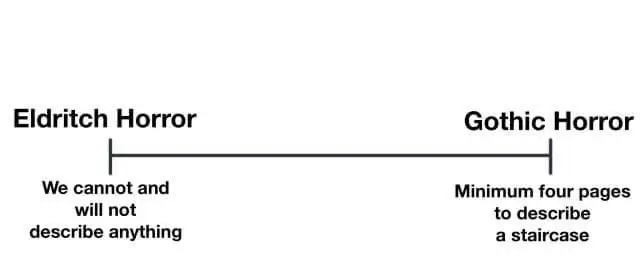"In fact, let me take a few pages to describe how much I can't describe this"
"In fact, let me take a few pages to describe how much I can't describe this"


"In fact, let me take a few pages to describe how much I can't describe this"


I signed up for a gothic class my frosh year that was described as American gothic-- vampires, werewolves, all that good stuff. I dunno if the prof didn't write the course description or if it got changed later but it was English gothic, which apart from the origins of the genre (Walpole, which ended up being hilarious because tons of modern tropes originated there, like the maiden in the castle using the subterranean staircase to flee from the mad king when a gust of wind blows her candle out) and some of the more satirical stuff (Austin), it was incredibly boring to read.
There was one called The Mysteries of Udolpho that's this meme times 10, where during a wagon trip there are literal 30 page descriptions of tress. I get if we'd been warned that this sort of thing was largely historical and we could pretty much skip the sweeping depictions of scenery that only existed because most people in the 19th century didn't get to travel much so it was exciting to read about exotic landscapes, but the assignment merely amounted to "Here's a 650 page novel, go read it for next week."
At least we got to do Frankenstein and I think there was one Poe story thrown in as well (despite being American).
I love eldricth horror precisely because of this. Imagination will almost always be scarier than something that can be put into words. Descriptions give handles to hold onto for your understanding, boundaries and walls for the horror to fit in.
Give me more vagueness about how, gazing at it, the room could not have possibly contained its size. The feeling of the split second while tripping before you connect with the ground, stretched into an interminable constant in the back of your mind.
My problem with that is that it's always the same descriptors for that unimaginable horror. Makes them boring if it's always the same.
Also, I feel like both Howard and Lovecraft were prone to incredibly lengthy descriptions of things
Lovecraft's stuff has that reputation, but on a listen through his works, he had a tendency to actually be properly descriptive when it was appropriate. I think it's a case of later, lesser writers gloming onto to making things indescribable as a lazy crutch that made the reputation of the mythos like that.
I think only 'The Unnamable' by Lovecraft really goes incredibly vague at a point where it should be describing the creature, but that story feels like a joke about this exact topic.
Tolkien describing his characters traveling fifteen meters
Here's an Ent that only appears for a total of 30 pages, let me write his entire family's history for an additional 50
Edit: fucking love me some LOTR, though
Ohhh yeah, so good
Tom Clancy has entered the chat and has started describing a submarine engine. Please help.
Robert Jordan describing all of the characters' clothes in a scene.
they sung as they walked along here's the entire song, all written out over two pages. I'm going to do this like 10 more times.
but then suddenly somewhere in the description of them eating stale bread it turns out 2 weeks have passed
I think this is Tolkien describing the history of the world. Like I get it, important council, but it's been 5 pages please, I will remember none of the 10 new character names I don't even know how to pronounce
Make it a triangle so you can add...
Erotic Horror: We really shouldn't describe this and you definitely shouldn't read it, but we all know it's far too late for any of us.
Cosmic horror is a close up on a man in a bowler hat's face in totally despair and creeping towards madness as lights and colors play across their face, screams of terror and pleasure crescendo giving way to Ode to Joy sung by a thousand angels, the man's face begins to laugh and contort, his eyes drift to the sides of his head his skull reshapes into non-euclidian shapes, angles that shouldn't exist, rubbery, and clear, a hand neither plant nor animal created from the remains of transdimentional beingings beyond comprehension and all known preception from a three dimentional mind space consume the rubbery man, in ecstasy.
Egberton Fleggious closes the Tome bound in the flesh of his beloved Sagithhorg, sickness drawing up from the soles of his feet, his head trembling with thoughts he will never be free from. In the distance he hears faint laughing. Drawing slowly closer. With every heartbeat.
I'll take mine about 1/3 from the left, please.
Where does Annihilation fit in here? Pretty sure it's both.